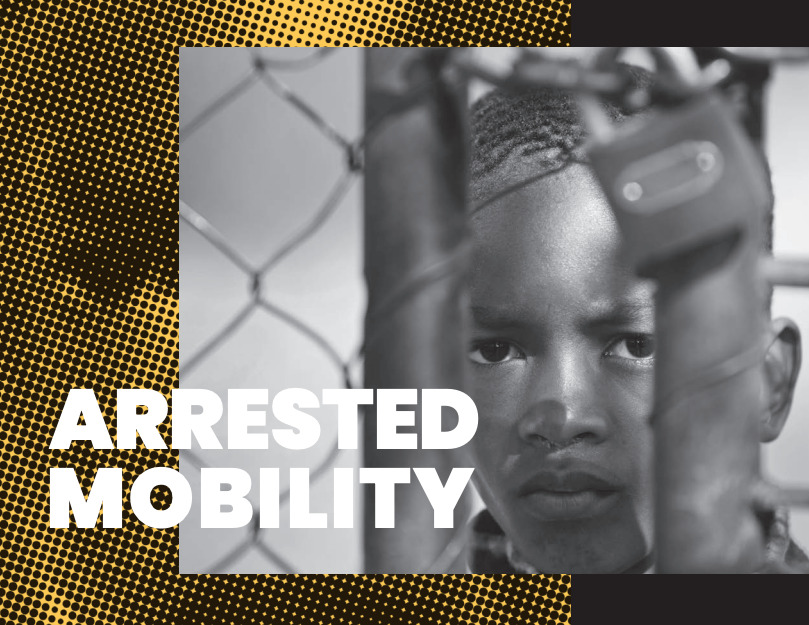Arrested Mobility Report Supports Decriminalizing Biking and Walking
Equitable Cities, led by renowned scholar Charles Brown, recently released a report about transportation-related policies and practices across the country that limit mobility, opportunity, and access for Black Americans and other people of color. Arrested Mobility finds that these policies deliver profound obstacles to equitable access to our public roadways, reflecting structural racism and White supremacy in policy, planning, design and infrastructure, and law enforcement.
It’s worth taking a closer look because this critical research points toward the need for change in traffic enforcement and CalBike’s Biking Is Not a Crime campaign.
Discriminatory laws aren’t just relics of the past
Arrested Mobility examines laws governing walking, biking, and e-scooter use. It surveys policies in all 50 states, plus the two largest cities in each state, as well as selected counties. The researchers find that these laws serve as a legal mechanism for racist, discriminatory, and predatory police enforcement.
Laws that enable biased policing aren’t just found in outdated regulations enacted decades ago. As e-scooters have increased their mode share, new mobility laws have been added to the books and often carry considerable ambiguity, as well as evidence of racist enforcement. Many of the laws regulating e-scooter equipment and behavior are similar to those regulating biking: It’s almost impossible to ensure equitable enforcement, and there’s inconclusive evidence that these policies improve safety outcomes.

California advocacy reflects national trends
This national study reinforces what we’ve found and have been fighting against here in California. In fact, the study’s number one recommendation is to repeal laws, decriminalize violations, and promote alternative enforcement for policies that have minimal impact on safety and that are enforced in a racially discriminatory manner. We did this with the leadership of Assemblymember Phil Ting by passing the Freedom to Walk Act in 2022, to significantly decriminalize “jaywalking.”
The study’s additional policy recommendations also address ongoing policy advocacy we’re doing in the California legislature. Building more active transportation infrastructure is our top goal for the state, not only to make our streets safer from traffic violence but also to reduce unwanted encounters with police. Encouraging the legislature to devote more resources to Complete Streets in the state budget will make people walking and biking safer both from traffic violence and police violence.
CalBike’s campaigns to make our streets safe for all Californians
Placing limits on pretextual stops was the goal of the Freedom to Walk Act, and we’re pushing for an expanded effort this year with the Stop Pretextual Policing Bill, authored by Senator Steven Bradford, which will decriminalize many low-level bicycle violations. The bill will also allow communities to remove traffic enforcement from the purview of armed police officers, reducing the risk of injury and death during a police-initiated traffic stop.
The Arrested Mobility study found that 32 states have laws strictly prohibiting sidewalk riding. Sidewalk riding ranked higher for states and counties than for city governments — an interesting outcome considering that cities are more likely to construct and maintain sidewalks than state and county governments. Sidewalk riding is another offense often selectively enforced against Black and Latino Californians, as uncovered in a bombshell LA Times investigation.
CalBike is sponsoring the Sidewalk Riding Bill, led by Assemblymember Issac Bryan, to address this issue, and so far our lawmakers agree. Riding on the sidewalk isn’t ideal, but for many streets, riding on the sidewalk is the only safe option. More than half of the country’s most dangerous roads for pedestrians are in predominantly Black or Latino neighborhoods, and police have used sidewalk riding bans to target people of color, often in communities without safe biking infrastructure.
Growing movement challenges discriminatory traffic laws
Arrested Mobility will be an invaluable resource for policy advocates such as ourselves and the growing movement across the country to change discriminatory mobility policies at all governmental levels. Many of the laws documented by the researchers are still on the books. While they’re intended to serve a pragmatic purpose, in practice they unfairly target Black people and other people of color.
This study shows the urgent need for additional research into how these policies are enforced in specific state, county, and local contexts, as well as their potential to be enforced inequitably. It certainly inspires us at CalBike to keep researching specific laws that can be reformed so that all Californians can move safely.





